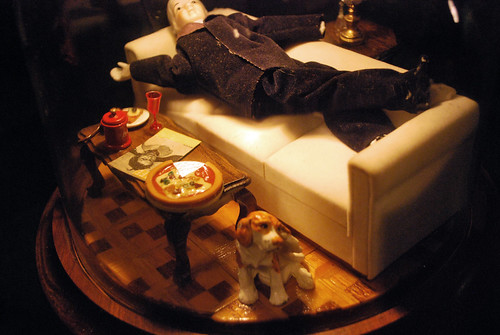October brings longer nights, and, in the upper Midwest, with its clouds and storms, darker nights. More time for dreaming; more time for nightmares.
In The Terrors of the Night (1594), Thomas Nashe writes of dreams:
There is no man put to any torment, but quaketh & trembleth a great while after the executioner hath withdrawn his hand from him. In the daye time wee torment our thoughts and imaginations with sundry cares and devices; all the night time they quake and tremble after the terror of their late suffering, and still continue thinking of the perplexities they have endured.I am a light sleeper. When my brother recently mentioned being woken by the ticking of his wife's watch as it lay on a table a floor below, I nodded in recognition. So while I am fortunate enough to dream extravagantly, my dreams tend not to take me over completely, not to disorient me on waking. I don't know the terror expressed in the passage below, which begins Charles Baxter's novel The Feast of Love (2000):
The man--me, this pale being, no one else, it seems--wakes in fright, tangled up in the sheets.I was led to the Baxter passage by Grace Dane Mazur's remarkable short book on the concept of the hinge, Hinges: Meditations on the Portals of the Imagination (2010), where she writes, about it and other works:
The darkened room, the half-closed doors of the closet and the slender pine-slatted lamp on the bedside table: I don't recognize them. On the opposite side of the room, the streetlight's distant luminance coating the window shade has an eerie unwelcome glow. None of these previously familiar objects have any familiarity now. What's worse, I cannot remember or recognize myself. I sit up in bed--actually, I lurch in mild sleepy terror toward the vertical. There's a demon here, one of the unnamed ones, the demon of erasure and forgetting. I can't manage my way through this feeling because my mind isn't working, and because it, the flesh in which I'm housed, hasn't yet become me.
The openings of some contemporary American masterpieces show the same sort of liminality and entrancement [as Proust] and also an intricate imbalance leading to a sort of structural instability--that state where things are so precarious that something has got to happen. This structural instability can come from being on the edge, or simply being on edge, and is often accompanied by uneasiness, excitement, fear.In one of the wonderful echoes that reading multiple books at once can generate, I had just that morning been reading Adam Thirlwell's The Delighted States (2007), which links Proust and Kafka in a chapter that begins,
At this point, it is also important to rethink the idea of real life.Describing an early draft of the opening of The Trial, Thirlwell writes, of the moment after the two officials enter Joseph K.'s room:
Joseph K., however, is quick to set things straight. He establishes friendly terms. "The strange thing is," says Joseph K., chattily, "that when one wakes up in the morning, one generally finds things in the same places they were the previous evening. And yet in sleep and in dreams one finds oneself, at least apparently, in a state fundamentally different from wakefulness*, and upon opening one's eyes an infinite presence of mind is required, or rather quickness of wit, in order to catch everything, so to speak, in the same place on left it the evening before."But, as Thirlwell explains, Kafka deleted that portion of the scene:
This conversation between Joseph K. and the guardes who have come to take him away, in which K. reports what someone once told him, that waking up is the "riskiest moment," because after all, "if you can manage to get through it without being dragged out of place, you can relax for the rest of the day"--this conversation disappeared.The omission, Thirlwell argues, is key: what separates Kafka's reflections on the disorientations of sleep from Proust's contemporaneous ones ("How then, searching for one's thoughts, one's personality, as one searches for a lost object, does one recover one's own self rather than any other? . . . One fails to see what dictates the choice, or why, among the millions of human beings one might be, it is on the being one was the day before that unerringly one lays one's hand.") is that Kafka never cues us to look to sleep's dislocations:
Ratehr than speculating on the fact that falling asleep might be ontologically dangerous, Joseph K. now wakes up in a world which is exactly like a dream. Like a dream, it does not feel like a dream at all.And, as a lived dream in the world, it is, inescapably and inevitably, a nightmare.
In Hinges, Mazur writes,
All these temporal and psyhic perversities combine to put us in an unstable situation in which something, everything, is bound to happen. We, and the characters, have entered into the world of the story, which is clearly a different world from our own.The same could be said for the world of the dream. Anything could happen--at least up to that moment when, as Paul Bowles put it ins Without Stopping: An Autobiography (1972), "a dream ceases to be a neutral experience and declares itself a nightmare." If we're lucky, at that moment we wake up, or at least begin to receive some intimations that this reality is not reality, and there will be an end to it. A way out.
Which brings me back to the opening, and the sense, on waking, that we have to quickly set the world to rights or risk being permanently unmoored. John Aubrey, in his endlessly diverting and useful Miscellanies Upon Various Subjects (1696), has an entry that suits, under the heading of "Of One's being divided into a Two-fold person":
In dreams it is a sign of death, because out of one are then made two, when the soul is separated from the body.Sleep is a prefiguring of death, a dream a hope for countering it, a nightmare a marker of our fears of it. There is a way out, a gate made neither or horn nor of ivory but of bleached bone, through which one day we'll all pass.


No comments:
Post a Comment